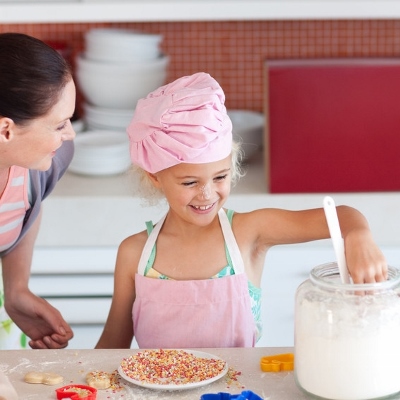 We all have one thing in common. We like to eat. As young children, most of us never gave a second thought to the preparation time that went into the meals we were served. We just knew that come supper time, our hunger would be appeased with a delicious plate of whatever mom or dad had prepared. Of course enjoying the luxury of prepared meals does not follow children into adulthood, and there comes a point when they must learn how to cook their meals for themselves. Without at least a basic knowledge of what happens in the kitchen, this can be quite the trying experience, with trial and error leading to more than one meal being either undercooked or burned to a crisp, during the self- learning process.
We all have one thing in common. We like to eat. As young children, most of us never gave a second thought to the preparation time that went into the meals we were served. We just knew that come supper time, our hunger would be appeased with a delicious plate of whatever mom or dad had prepared. Of course enjoying the luxury of prepared meals does not follow children into adulthood, and there comes a point when they must learn how to cook their meals for themselves. Without at least a basic knowledge of what happens in the kitchen, this can be quite the trying experience, with trial and error leading to more than one meal being either undercooked or burned to a crisp, during the self- learning process.
While your child is young, why not at least give them an elementary indoctrination to cooking? Let them help out around the kitchen. It can be as easy as laying out the ingredients and spices and letting them measure out the proper amounts of each. As a side benefit, they may even learn a little something about fractions. Allow them to then mix in what they have measured at the proper time, and explain what each ingredient will do, such as paprika adding a smokiness, so they better understand the purpose of each.
Children love to learn, and by being involved in the process of a cooking a meal, you may be surprised when your child develops a greater interest. This is when things can get fun for the parent and the child. Taking things a step further, sit down with your child and plan out a week’s worth of meals, of course guiding them along the way to make certain what they are planning is healthy and nourishing. This will open the door to discussing the three food groups and the benefits of each.
Once the menu has been selected, you may even wish to take your child grocery shopping, allowing them to select the perfect cuts of meat, the plumpest chicken, or the freshest and best-looking vegetables.
Once you have everything needed for the week, make it a nightly ritual of them helping you out, slowly teaching them more difficult skills, such as flipping an egg, or turning a steak.
Once your child has developed some skills around the kitchen, it’s time to step aside (but not too far) and let them try their hand at preparing an entire meal, or at least one complete side dish.
The important thing in teaching a young child the basics of cooking is to keep it fun. What they learn today will help them tomorrow.










